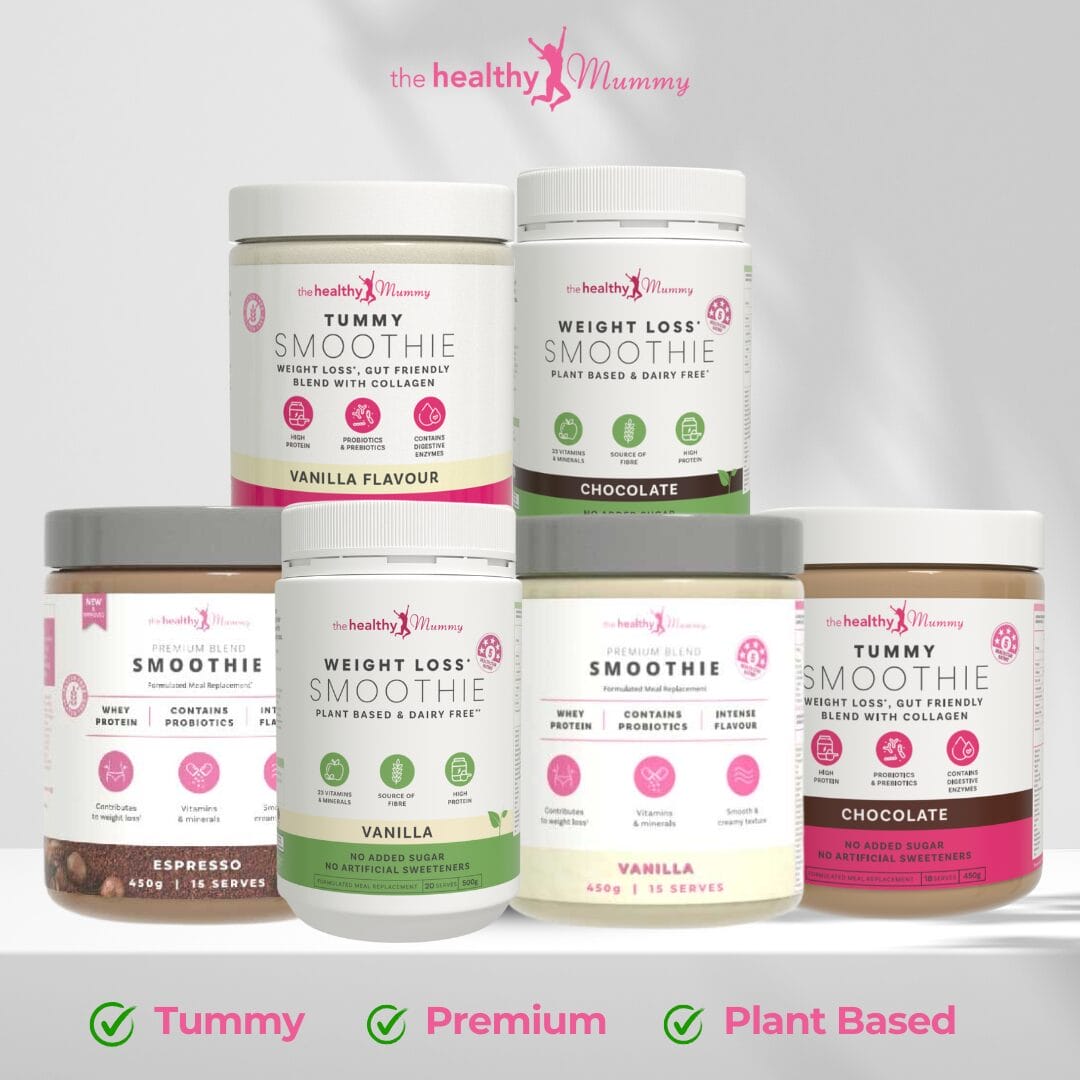Menopause & Weight Gain
Menopause and weight gain – everything you need to know
When you hit the age of 45 you may begin to notice that you’ll have a harder time keeping off the weight.
It’s a fairly common occurrence ahead of menopause and is often called the middle-age spread. Women are likely to gain an average of half a kilo a year between the ages of 45 and 55.
In fact, experts say you’ll burn about 200 fewer calories by the age of 45. But don’t throw in the towel – you can still get in your best shape yet.
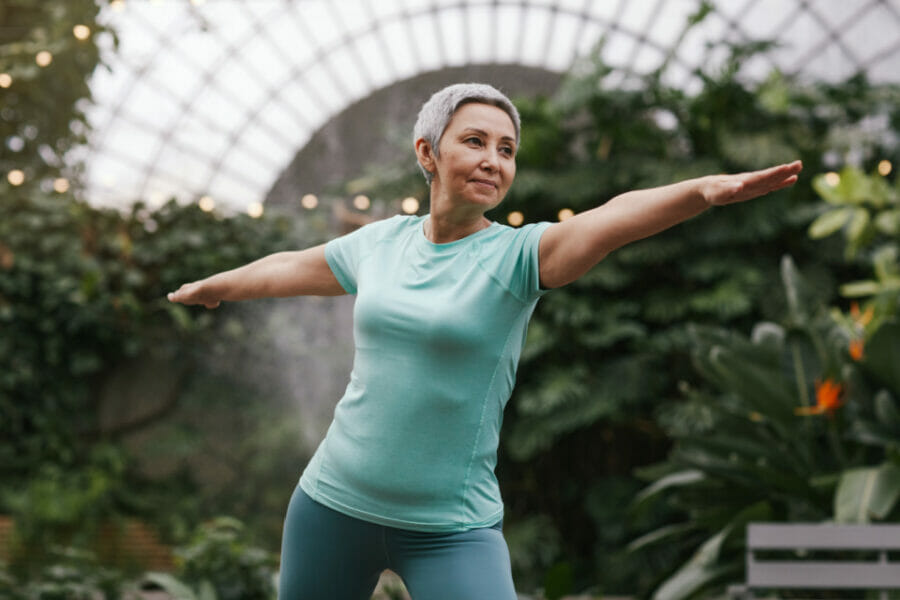
Weight gain during menopause
Most menopausal women notice they gain weight around their belly around the time of menopause as hormonal changes alter the way the body uses calories.
On average, most women develop menopause around the age of 51, and symptoms usually occur four years before their last period.
What is perimenopause?
Perimenopause is the transitional time before menopause, and usually occurs eight years before menopause -but can occur from mid-30s.
For many women, this phase only lasts a short amount of time. However, for some it can last four to eight years.
The hormones influencing how tight clothes feel and the number on the scale include sugar-balancing insulin, energy-burning thyroid, female hormones oestrogen and progesterone and stress hormones adrenaline and cortisol.
Easy weight loss needs all of these hormones to be in balance and when these things are out of balance they can contribute to weight gain.
What women find so confusing is they may have eaten this way their whole lives and maintained a healthy body weight, but from their 40s on, their body no longer tolerates it and they begin to have more belly fat. This is usually down to the effects of menopause.
So an important part in managing weight during this menopause transition is to reduce simple sugars plus consuming sugar balancing minerals chromium and magnesium.

Symptoms of menopause
The most common symptoms of menopause are hot flushes, which occur in around 75 per cent of women who go through menopause.
Other menopause symptoms include:
- Weight gain
- Depression and anxiety
- Reduced bone and muscle mass
- Vaginal dryness
- Headaches
- Reduced libido
- Poor concentration & memory
- Increased urination and urinary tract infections
- Dry skin
- Tender breasts
- Stiff joints
- Thinning hair
- Increased heart rate
- Increased facial, chest and neck hair
Tips for alleviating symptoms include wearing loose, light clothing to avoid excess heat when hot flushes occur and carrying a manual hand fan; and exercising for at least 20 to 30 minutes per day, as exercise is also associated with improved sleep, increased energy and a better mood.
If you find you are experiencing any of these symptoms, we recommend you speak with your medical health care provider who may be able to help you with hormone therapy.
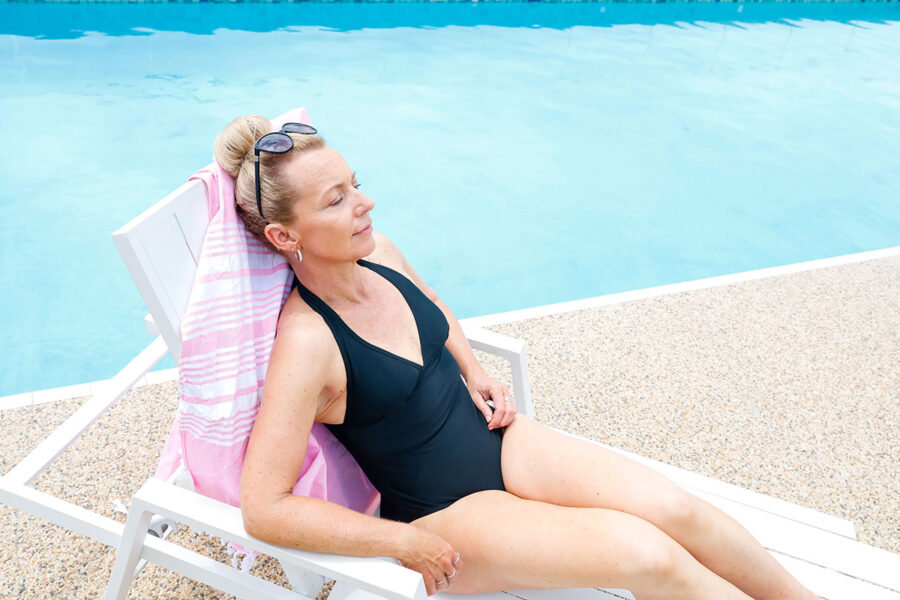
How your hormones affect your weight during menopause
Insulin and weight
Eating simple sugars like processed foods, bread, pasta, cakes, chips, soft drinks and alcohol will increase the amount of sugar in the blood.
This causes the hormone insulin to be released and for most menopausal women this leads to increased fat stores and you may find your body mass increases as well as your body fat.
Oestrogen, progesterone and weight
Foods called phytoestrogens, palm-sized oestrogens, like those found in soybeans and flaxseeds, boost the female hormone oestrogen whilst nutrients like zinc, vitamin c and B6 help progesterone to be produced.
Thyroid and weight
Women over the age of 45 are most at risk of a sluggish thyroid, which can cause weight gain, low mood, fatigue and change temperature control in the body.
Eating foods containing iodine, selenium, zinc, vitamin A, vitamin D and biotin is a beautiful and real way to support thyroid health.
Stress hormones and weight
Chronic ongoing stress as well as mental stress and physical stressors may be the result of not getting enough sleep.
Some women find they have high inflammation levels from too many sugars in the blood, and this all contribute to the production of stress hormones. Unfortunately, when these stress hormones are too high they influence blood sugar levels, insulin, and can cause fat gain around the belly as well as type 2 diabetes.

How to stop menopausal weight gain?
Women are more likely to gain weight and notice changes in their overall health after their baby making years. This is largely down to the hormonal changes of menopause.
But one of simplest ways to reduce weight gain is to work on your hormones. By matching the nutrients needed by these different hormones you can help balance your body out and manage the side effects of menopause.
Choose a plate overflowing with fibre rich veggies, a palm-sized amount of quality protein like fish, nuts or seeds and a tablespoon of healthy fats like avocado or extra virgin olive oil at every meal.
How to manage your weight during menopause
- Eat a healthy diet
- Do regular exercise, any physical activity is better than none
- Build up your muscle mass with strength training
- Seek menopausal hormone replacement therapy from your doctor
How to cool hot flushes
To reduce the number and intensity of hot flushes, it means you will need to try targeted remedies known to turn down the heat in the body, supporting female hormones and the organs that produce them, and avoiding the known triggers that leave women drenched in sweat.
Soybeans and flaxseeds have been found to help hot flushes by balancing the female hormone oestrogen so ensure you are getting enough in your diet.
Make sure you speak with a health professional or talk to your doctor before you start making any drastic changes during menopause.
Post-menopausal health
After menopause, the adrenal glands take over the job of making female hormones. These amazing organs also make stress hormones.
Women in their mid-40s to 50s may feel stressed, burnout, feel tired and experience excess weight around their abdomen – these are some of the worst menopausal symptoms. So a key strategy is to nourish the adrenals with Vitamin C, zinc, magnesium and B vitamins.
The hardest step and yet the most rewarding one for most women is avoiding the triggers known to cause hot flushes, which are alcohol, chocolate, coffee and warming spices.
How eating a healthy diet can help improve the symptoms of menopause

Depression, insomnia, anxiety and general sadness should be addressed with your GP, or a psychologist or counsellor. Eating a balanced diet that specifically addresses the symptoms of menopause is paramount.
The following are foods to include in your diet:
Chia seeds are a source of omega-3s, which reduce depression and anxiety.
Oatmeal, which is slow burning, will keep you running all morning and prevent you from crashing and feeling fatigued and hungry.
Kefir has been shown to assist with anxiety and decrease depression. It is rich in tryptophan, which assists with sleep.
Tart cherry juice contains tryptophan, which helps the body produce melatonin, and a good amount of melatonin itself, the sleep hormone that helps the body transition to sleep. Studies suggest that consuming tart cherry juice leads to better and longer sleep.
Dark leafy greens are high in magnesium, which is a great mineral to assist with heartbeat regulation and sleep. Fresh vegetables contain plenty of antioxidants that protect our cells from damage due to free radicals, and can help maintain a healthy weight.
Fatty fish contain fatty acids, which can help regulate blood pressure, which in turn can help to control hot flushes. Fatty fish are also high in vitamin D, which is helpful for bone health and mood.
According to ancient Chinese medicine, apples, spinach, broccoli, eggs and green tea are cooling foods that can help cool you down.
Help alleviate menopause symptoms with these recipes
Turmeric Cauliflower with Grilled Salmon
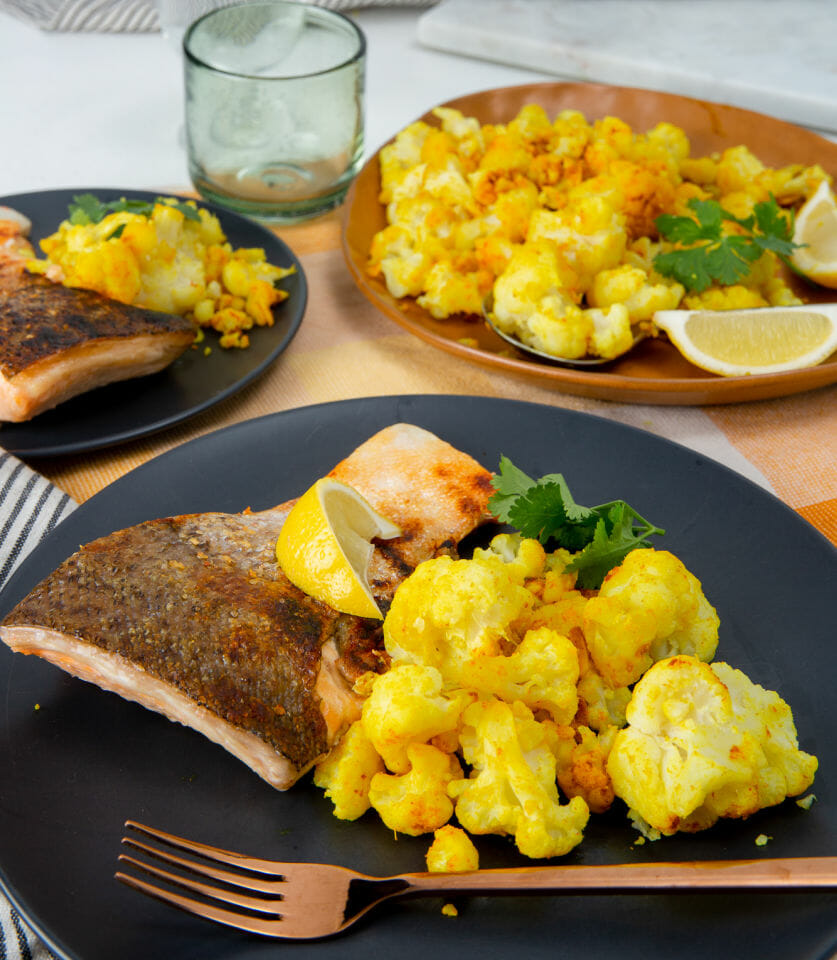
Get this Turmeric Cauliflower with Grilled Salmon recipe here
Blackcurrant, Oats & Chia Seeds
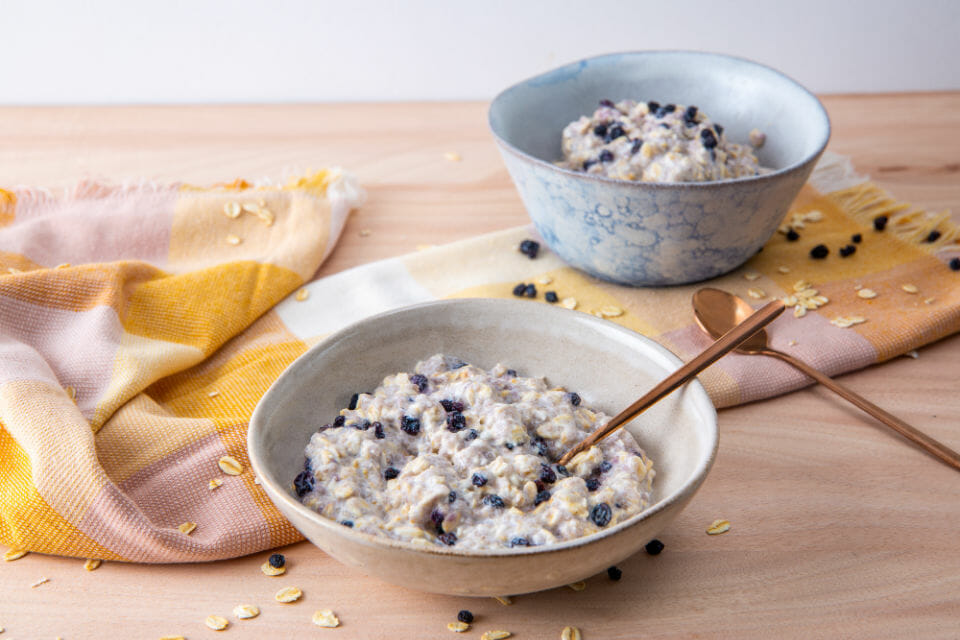
Foods to include in your diet for menopause
To help you with the symptoms of menopause, you should ensure your diet for menopause includes these essential foods.
1. Fruit and vegetables
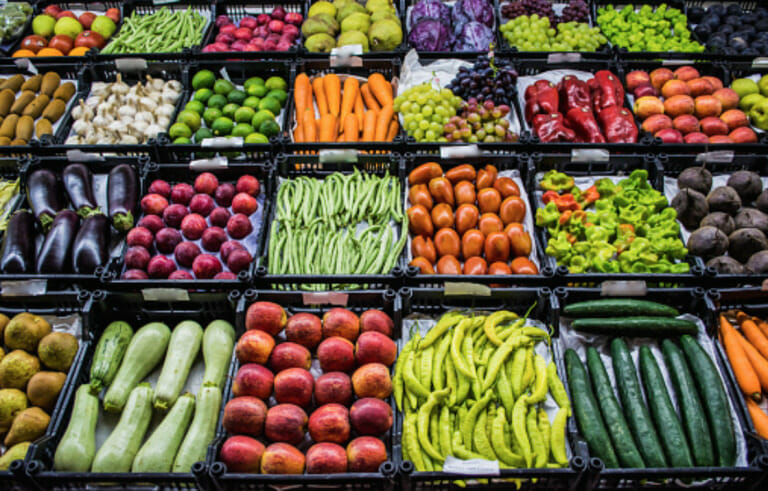
Eating a healthy diet for menopause is crucial in helping to balance your hormones and improve your low mood.
Moreover, many fruits – such as blueberries – and vegetables are rich in antioxidants.
These antioxidant-rich foods may help reduce blood pressure during this time in a woman’s life, also reducing her stress levels.
2. Legumes and nuts
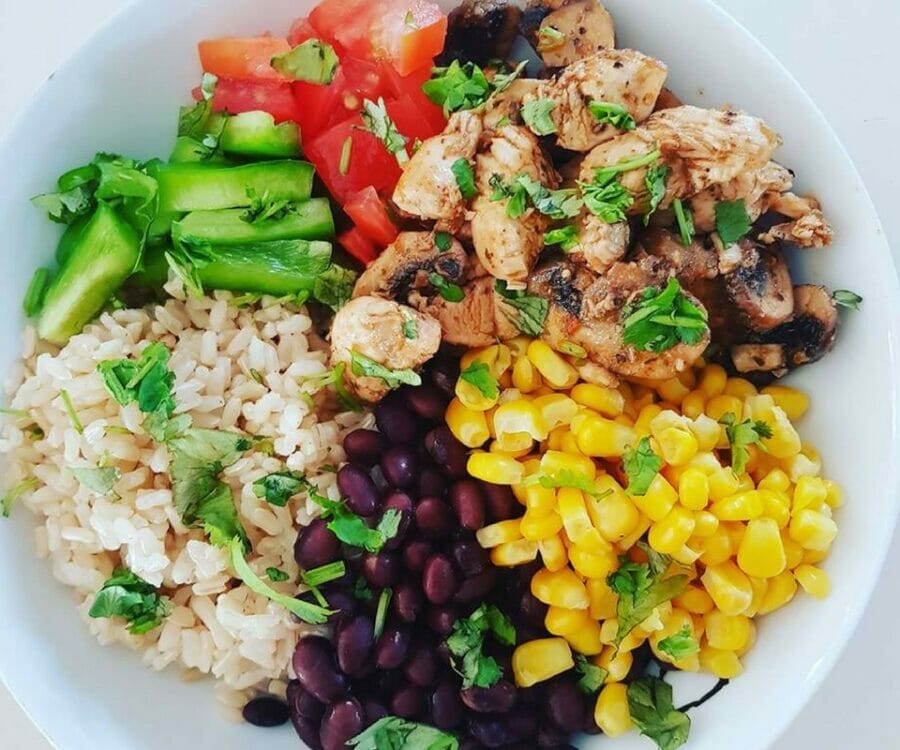
Soybeans, chickpeas, nuts, black tea, barley, grapes and berries contain natural oestrogen, which may help counterbalance the oestrogen that is being reduced during menopause.
The decline in oestrogen during menopause is also linked to decreased bone strength and muscle mass. So finding ways to increase these things through your diet for menopause will help ease your symptoms.
3. Fatty fish
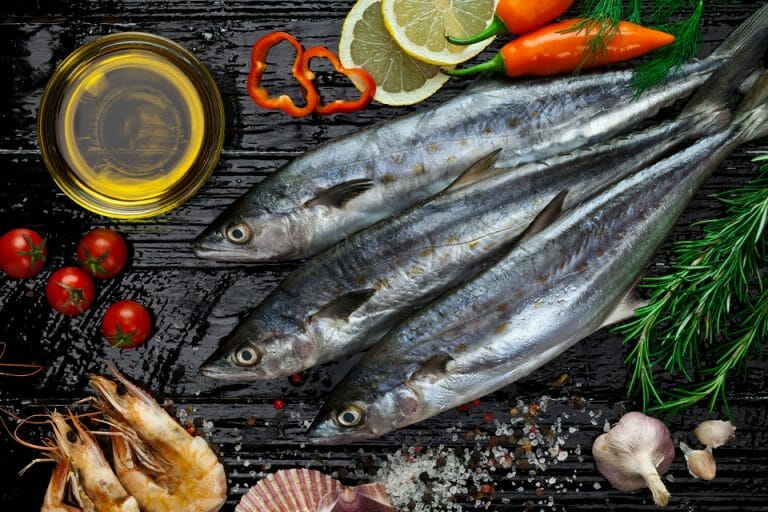
Fatty fish is rich in omega-3, which can help improve your mood and keep your blood levels and blood pressure in check.
4. Dairy

Dairy products, such as milk, yogurt, and cheese, contain calcium and vitamins D and K, which are essential for bone health and therefore perfect to include in a diet for menopause.
5. Protein
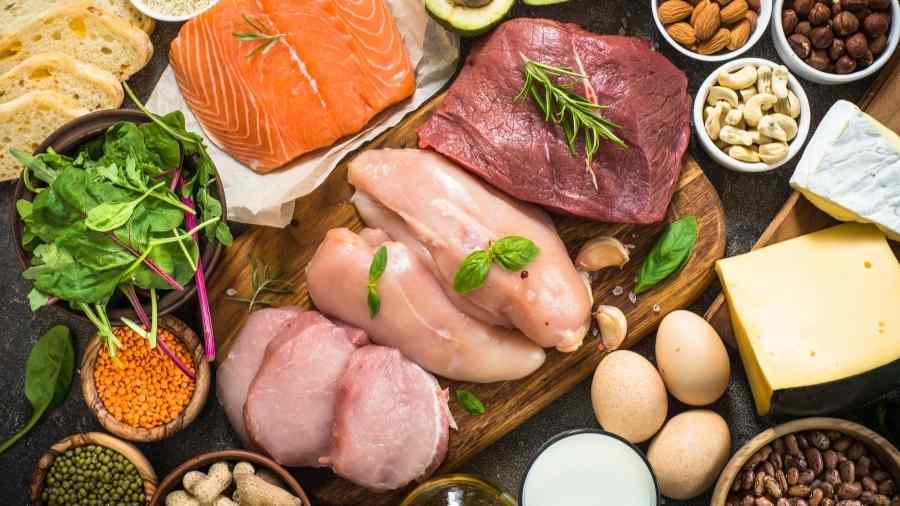
During menopause, women will see a decrease in bone strength and muscle mass due to lower estrogen levels. As such, you should include good quality protein in your diet for menopause to help supplement these decreases.
Food to avoid putting in your diet for menopause
Certain foods will worsen symptoms of menopause, such as hot flashes, interrupted sleep and weight gain. When you’re working on your meal plan and organising your diet for menopause, there are some foods you’ll want to avoid.
1. Sugars and processed carbs
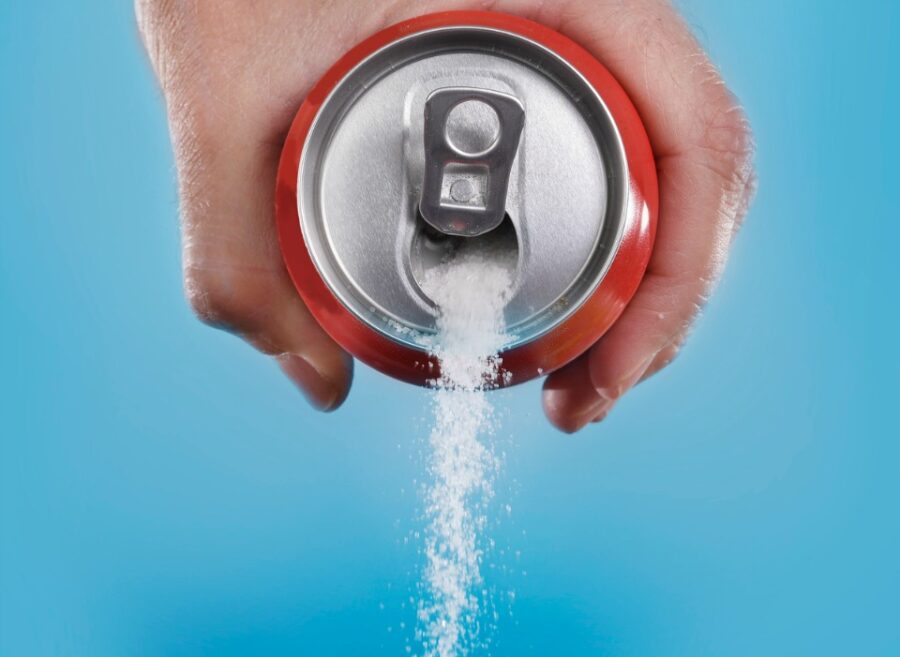
Not only do processed carbs and added sugar make you put on weight, but they can also lower your mood and increase your blood sugar levels, making hot flashes worse.
2. Alcohol

Alcohol can trigger hot flashes in women experiencing menopause. It might also reduce the quality of your sleep.
3. Caffeine

Some studies have suggested caffeine consumption aggravates menopausal symptoms, such as hot flashes and night sweats.
4. Spicy food
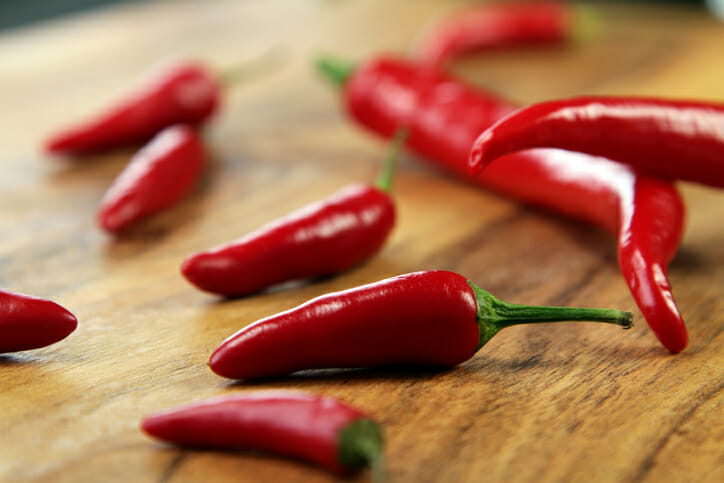
There is some evidence that spicy foods increase the number of hot flashes a woman might be experiencing during menopause.
5. Salty foods
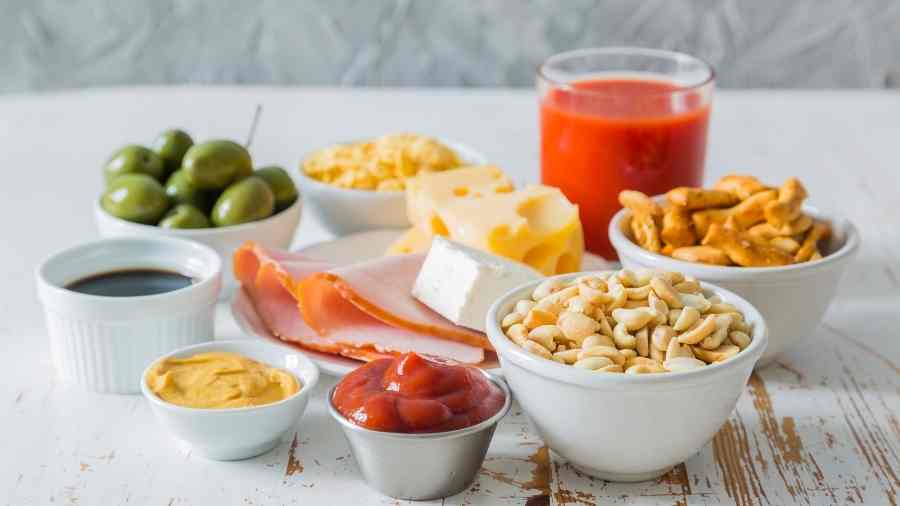
High salt intake has been linked to lower bone density in postmenopausal women. The decline in estrogen in menopause can increase your risk of high blood pressure. Avoiding salty foods in your diet for menopause may also help reduce these risks.
The best yoga positions to help menopause
Yoga can help with menopause by helping you centred in your body and connect with it so you can notice the changes. Some of these changes can be more subtle than others.
You may notice that you develop symptoms such as hot flushes, irregular periods, heavier periods, lighter periods, night sweats and flushing.
One of the first signs you may notice is not experiencing menstruation for 12 months. This indicates that menopause has begun, whereas if you’re still menstruating, but it’s unpredictable, you may be in perimenopause.

How yoga can help with menopause
Lyn Savage is a qualified yoga instructor who specialises in teaching students to connect to themselves and focus on the breath as they move and learn to feel their bodies.

“Menopause is a time when women need to become more conscious of their bodies and learn to take better care of themselves,” she says.
“When we’re younger, our bodies bounced back from ‘abuse’. This abuse may come in the form of bad dietary choices, too much alcohol not enough exercise. The list is endless, but for many in this phase of life, the body starts to fight back.”
“Suddenly, the extra weight around your belly becomes stubborn, and a quick diet no longer does the trick. You start to feel the dramatic effect of a hangover after an evening of indulging in too much wine.”
“Whatever your’ wake up’ call is, you start to look more carefully at your habits and how they affect your day-to-day physical feeling and mood.”

During menopause it’s important to look after yourself
Lyn says this is a time to look after yourself, to put yourself first. To look at your choices, how you eat, how much sleep you get and how you exercise.
All these things can dramatically affect how smoothly you move through this time in your life. Yoga can help with menopause and the easing of the symptoms.
Many changes happen in your body when you go through menopause, and you’ll often find it hard to start something new. The good thing about doing yoga to help menopause is that you can begin slow and at home.
Other tips for alleviating symptoms include wearing loose, light clothing to avoid excess heat when hot flushes occur and carrying a manual hand fan.
Also, exercising for at least 20 to 30 minutes per day as exercise is also associated with improved sleep, increased energy and a better mood.
Can yoga help with hot flushes?
Yoga does not stop hot flushes, but it can aid in helping to reduce the mental effect they have on you and, therefore, on your body.
“We turn to more restorative yoga when we look for a way to curb these symptoms and to calm our nerves,” says Lyn.
“The aim of a practice designed specifically for menopause is to find relief from hot flushes by choosing poses that cool the body. We step away from a vigorous practice and direct our focus to something more restorative and cooling.”
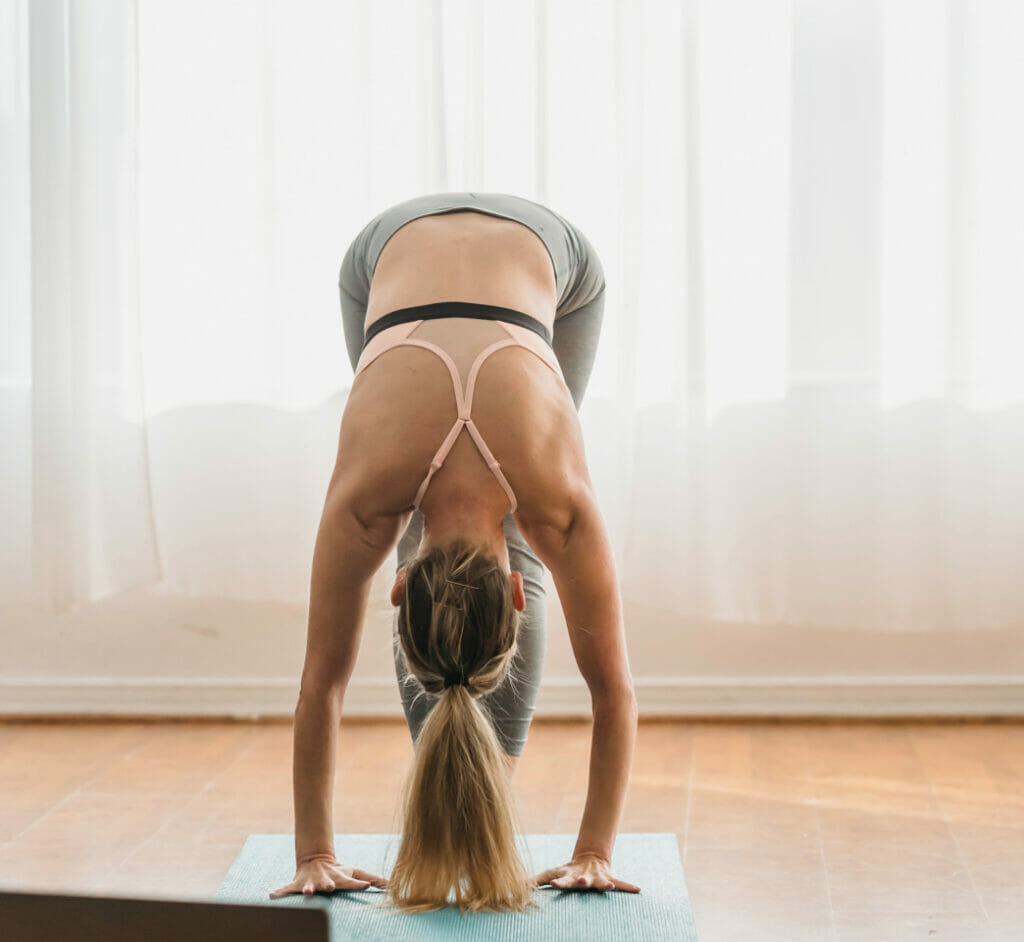
Cooling poses include:
- Forward Fold
- Puppy Dog Pose
- Fish Pose
“A dynamic pose that can have a beautiful calming and cooling effect on the body is Flowing Half Squat,” adds Lyn.
“Moving from side to side in a rhythmic, fluid way, guided by breath, will flood the body with the essence of cool flowing water, thus relieving some of the heat from the body.”

Yoga positions to help with stress and fatigue
“Over this period [menopause], a lot of change is going on through the body. This can have a big impact on the quality of our minds.” Says Lyn.
Yoga can reduce the emotional symptoms of menopause, doing more than just treating physical pain.
Energising and stress relieving poses include:
- Legs Up the Wall
- Warrior II
- Downward-Facing Dog
These all help increase oxygen and blood flow and calm the mind to help you deal with the many menopause symptoms you may experience.

Practising yoga safely in menopause
Hopefully, you can see how yoga can help with menopause, but before jumping in, you must ensure your practice is safe. Whether doing yoga positions to help menopause or perimenopause, it’s vital to look after yourself.
Aches, pains and joint stiffness are more common as you get older and common menopause symptoms, so it’s a good idea to start slowly. Start by doing warm-ups, such as simple body stretches and then build up to the more intricate positions to help menopause.
Make use of furniture to support you if you feel the need. Don’t push your body into movements if you feel uncomfortable or they seem too difficult.
A great idea if you’ve never done yoga before is to start by going to a class with a professional instructor. Yoga can help menopause and be done at home, but getting tips and advice from a professional will ensure you’re not doing more harm than good.
5 easy and effortless ways to lose weight as you get older
When you hit the age of 45 you may begin to notice that you’ll have a harder time keeping off the weight.
It’s a fairly common occurrence ahead of menopause and often called the middle-age spread. In fact, experts say you’ll burn about 200 fewer calories by the age of 45.
1. Eat more fibre
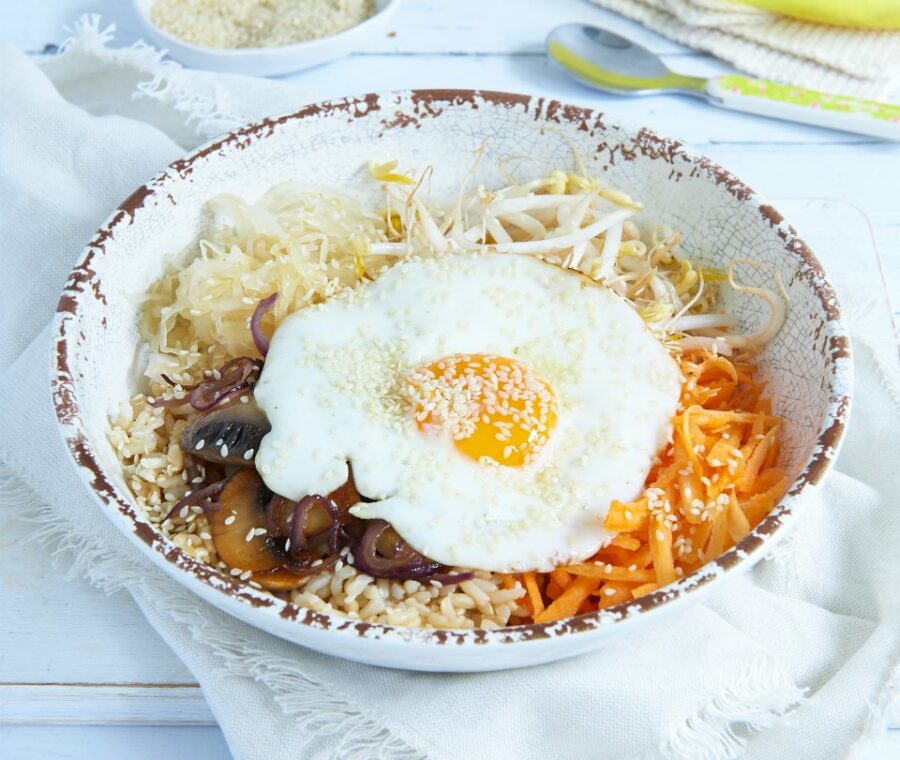
As you get older, your digestive system changes, it can become more sluggish. You may struggle to go to the toilet more regularly and you might find you begin to develop haemorrhoids from straining. This is why it’s important to add more fibre to your diet.
Not only will it keep things moving, it will keep you regular and help speed up your digestive system.
2. Watch what you are eating

Once you hit 45, you’ll notice that naughty food you could eat in your 20s and 30s you may not be able to anymore without them going to your thighs. Choose more fruits, vegetables and whole grains.
3. Up your protein
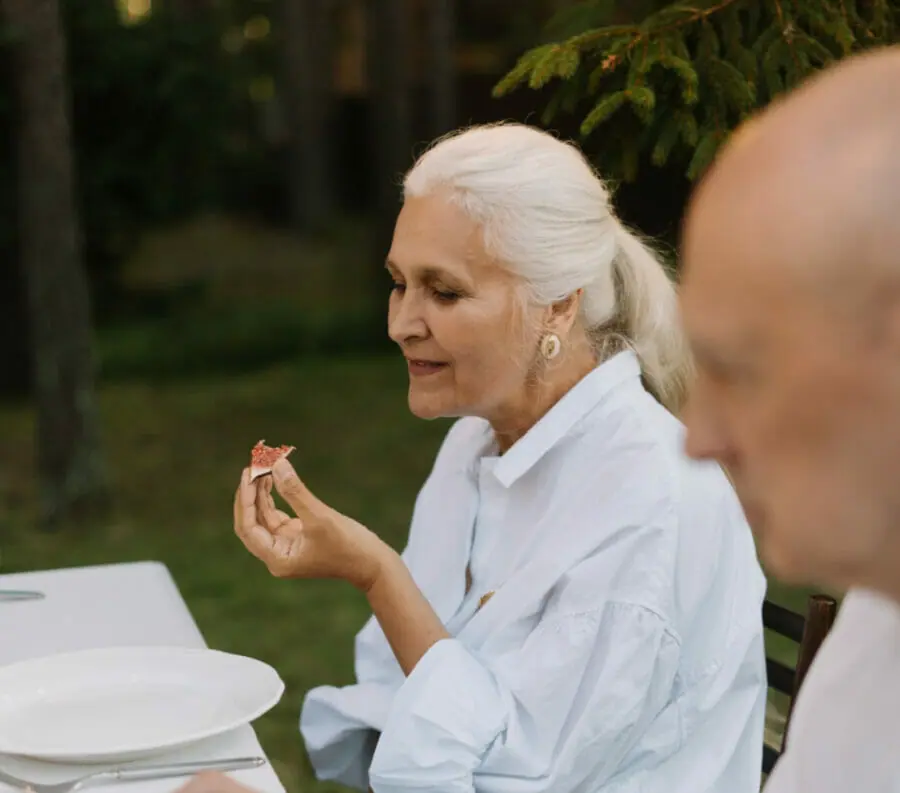
Building muscle after you age can be tricky but it can be done. After the age of 30, we lose muscle mass in our bodies. This is why it is important to focus on upping the protein in your diet.
The reason women over the age of 45 should focus on building muscle, is because muscle burns more calories than fat, so as we lose muscle it makes it more likely we will begin to store fat.
So, this is why strength training is important and older women should overhaul their diet and focus on building up muscle mass.
4. Drink green tea
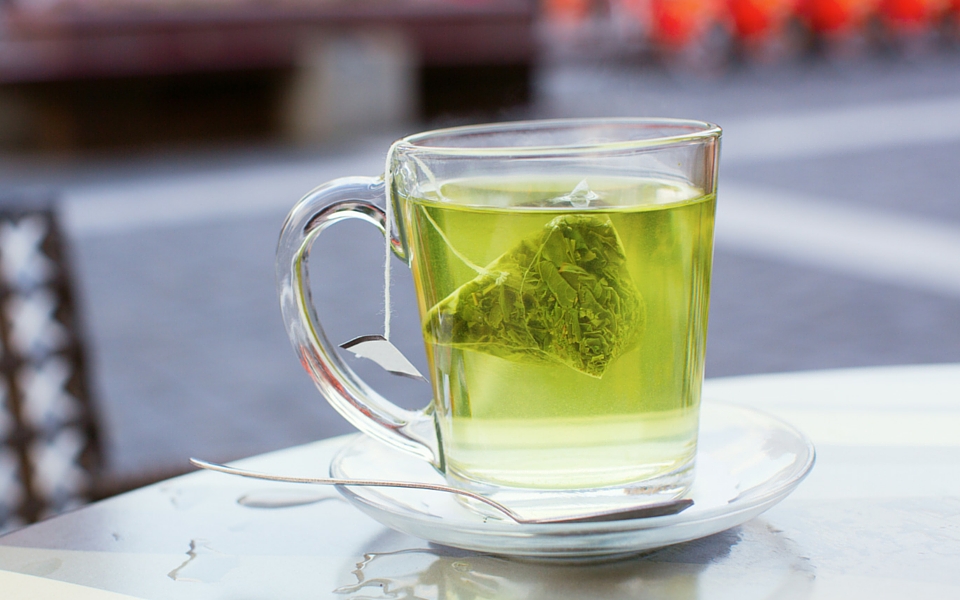
If you’re wanting to lose some weight, or simply want to maintain a healthy weight, green tea may help because tea catechins (especially EGCG) have been found to support weight loss.
What’s more, the combination of caffeine and L-theanine in a cup of green tea not only makes you feel good but may enhance your overall brain performance, especially your memory. Green tea may also protect your brain from ageing and developing diseases such as Alzheimer’s and Parkinson’s.
5. Exercise regularly
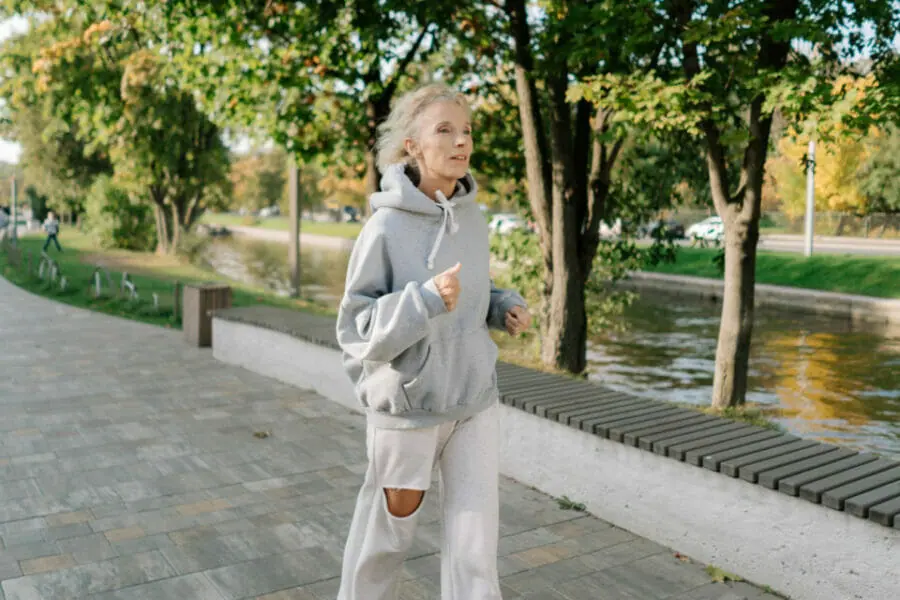
Our metabolism decreases as we get older, so in order to boost it aim to do more physical activity than you were doing before. You could try walking everywhere or including more exercises in your day.
Start by focusing on smaller weights then build up. Be sure to consult your physician before lifting any weights if you feel unsure.
Try low impact exercise, such as walking and swimming, as these will help reduce the risk of injury and also helps build up muscle. Try adding an extra 10 minutes to your exercise regime to offset your slower metabolism.

Get help if you are struggling with the hormonal and physical changes of menopause
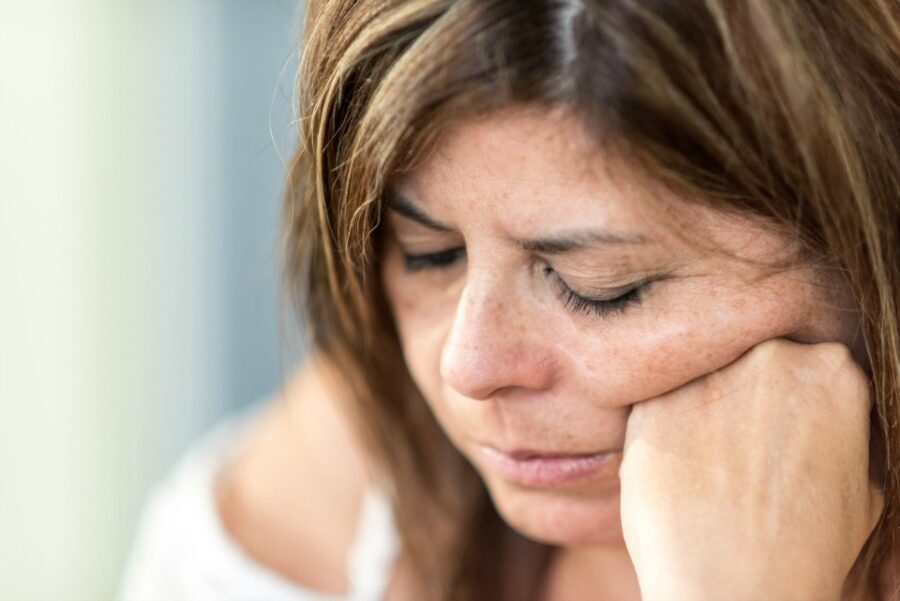
Depression, insomnia, anxiety and general sadness should be addressed with your GP, a psychologist or a counsellor. Eating a balanced diet that specifically addresses the symptoms of menopause is paramount.
Making lifestyle changes can help support other treatment options you may be looking at to support your journey with menopause.
Skip the guilty shakes. This is a better way to Smoothie

